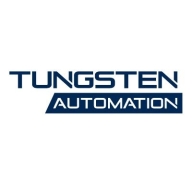

Appian and Tungsten Insight compete in the business process management sector, each offering unique workflow automation and data analysis solutions. Appian holds an advantage due to its ease of use, while Tungsten Insight offers deeper feature sets justifying its higher cost.
Features: Appian's strengths are found in its low-code platform for rapid application development and robust integration capabilities, simplifying user experiences. Its platform is designed to facilitate quick adaptation and deployment. Tungsten Insight shines with its advanced analytics and deep customization options, allowing organizations to harness detailed insights from vast data sets and tailor solutions to meet specific needs. Additionally, it provides comprehensive options for precision in data handling.
Ease of Deployment and Customer Service: Appian offers a straightforward cloud-based deployment model supported by expansive resources, allowing for swift implementation and adaptability. Its support infrastructure is tailored to guide organizations seeking rapid operational readiness. Tungsten Insight requires a more intricate deployment process, often necessitating specialized assistance. Despite this complexity, it offers a reliable customer service experience that guides businesses through its deployment intricacies effectively.
Pricing and ROI: Appian maintains a competitive pricing structure by striking a balance between initial setup costs and long-term savings through streamlined operations and user satisfaction. The emphasis on efficiency can contribute to a favorable ROI. In contrast, Tungsten Insight requires a higher initial investment, offset by potential high returns stemming from its robust features and powerful analytics capabilities, especially beneficial for data-driven decision-making. This appeals to organizations willing to invest in comprehensive capabilities, aiming for significant gains.

Appian is a unified low-code platform and solution used by businesses to build enterprise applications and workflows. This product adapts to the needs of clients and the technologies they are already using to combine their data in a single workflow and maximize resources. The platform has four main components through which it transforms the work process for companies of various sizes. They are:
Appian is utilized across a diverse set of industries, including automotive and manufacturing, energy and utilities, education, financial services, telecom and media, transportation, retail, insurance, healthcare, and life sciences. The most frequent use cases of Appian are customer journey, governance, risk and compliance, operational efficiency, supply chain, distributed order management, and environmental, social, and governance (ESG) management.
Appian Features
Appian has various features that allow users to create solutions for their businesses. These features can be separated into a few groups according to function, including automation, low-code application development, and integrations and data. Some of the most frequently used features of Appian include:
Appian Benefits
The benefits of using Appian include:
Reviews from Real Users
A practice leader - digital process automation at a computer software company values Appian highly because the product is easy to develop, low-code, and has a good user interface.
Alan G., an advisory board member at Codecon VR, Appian offers a clear application life cycle, easy to learn documentation, and comes with a fundamentals course.
We monitor all Process Mining reviews to prevent fraudulent reviews and keep review quality high. We do not post reviews by company employees or direct competitors. We validate each review for authenticity via cross-reference with LinkedIn, and personal follow-up with the reviewer when necessary.